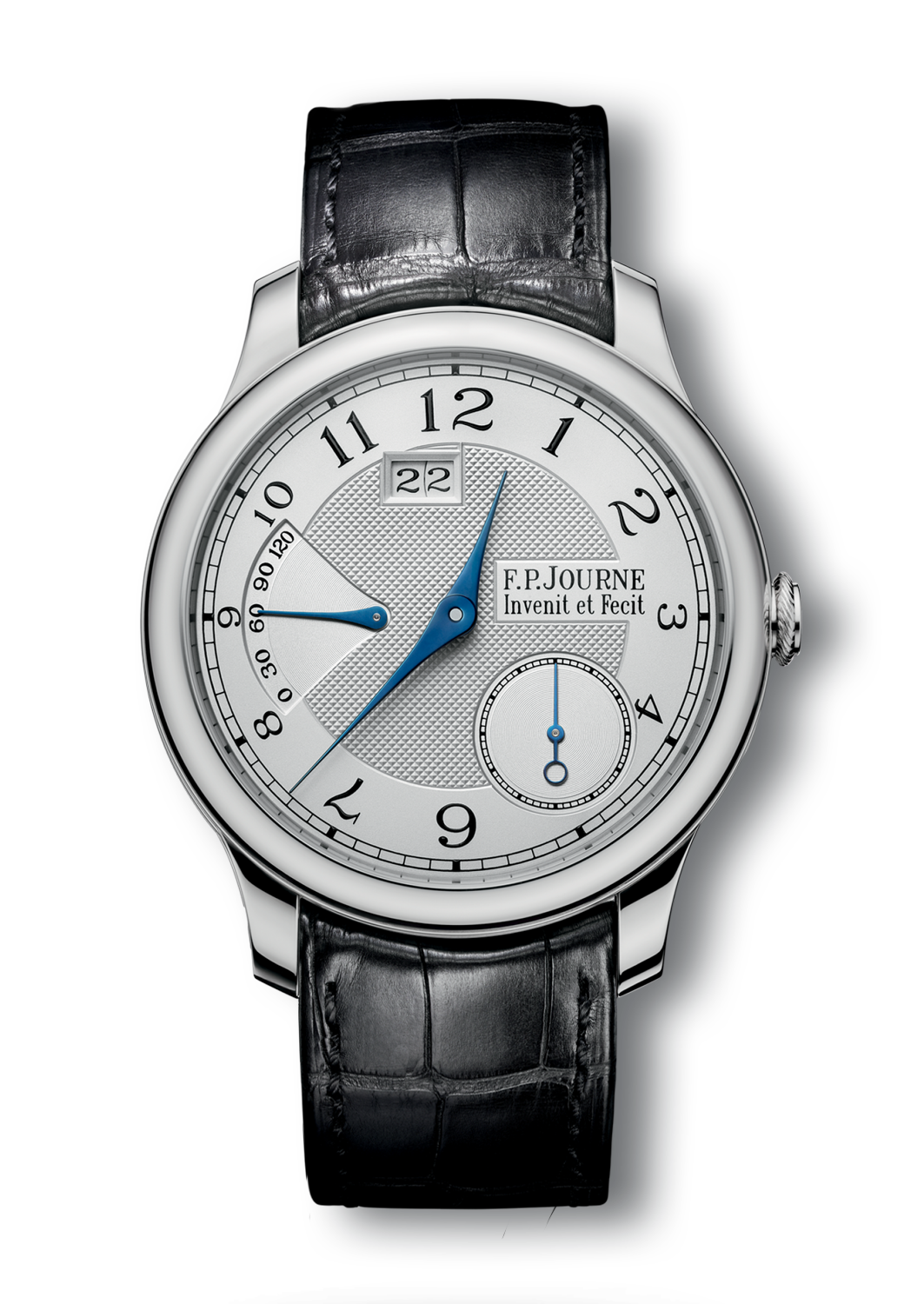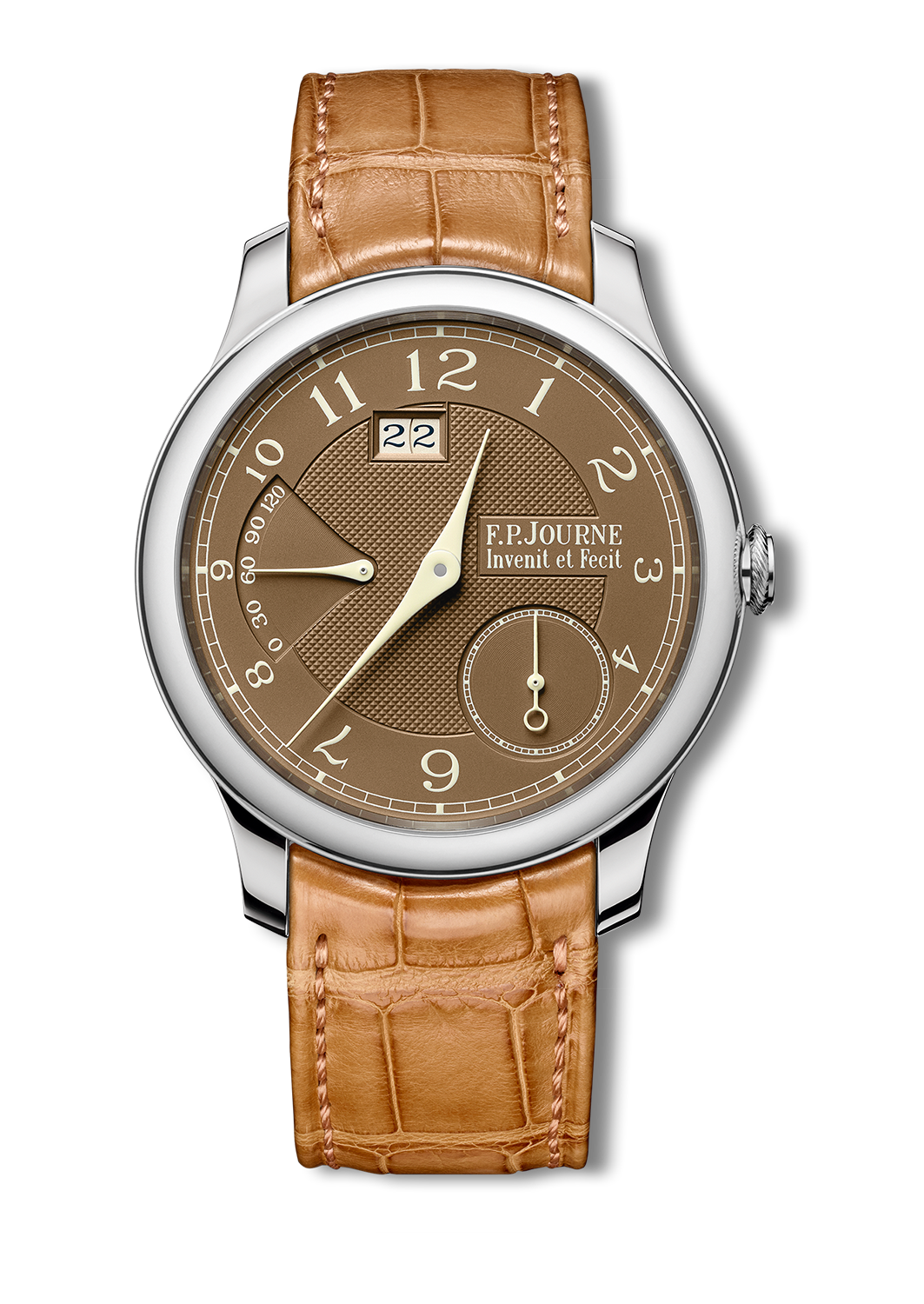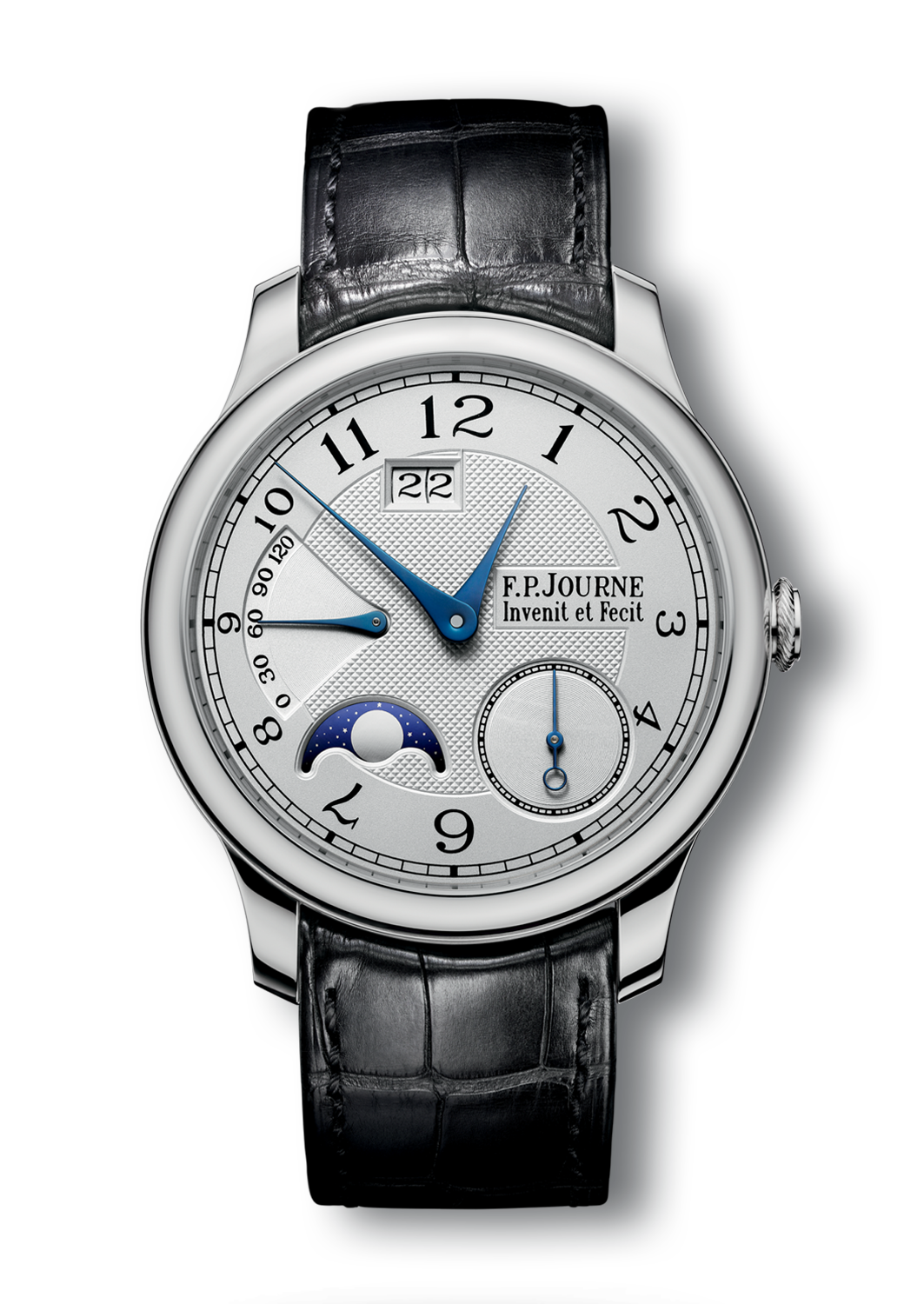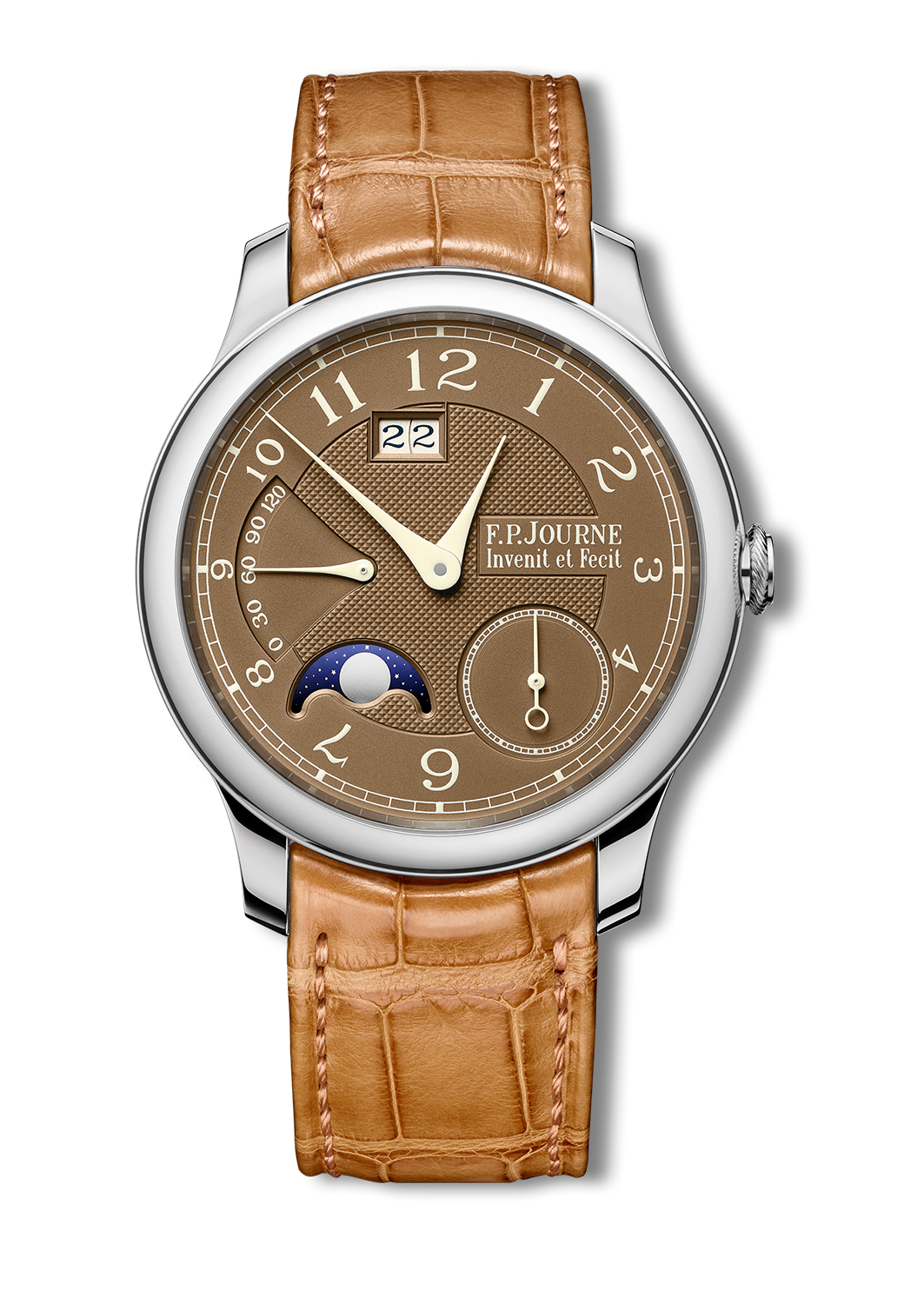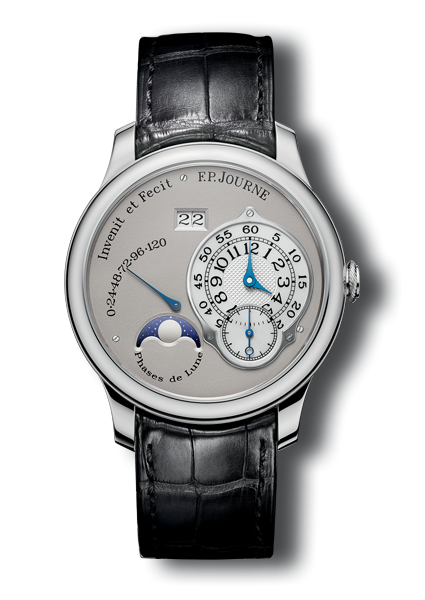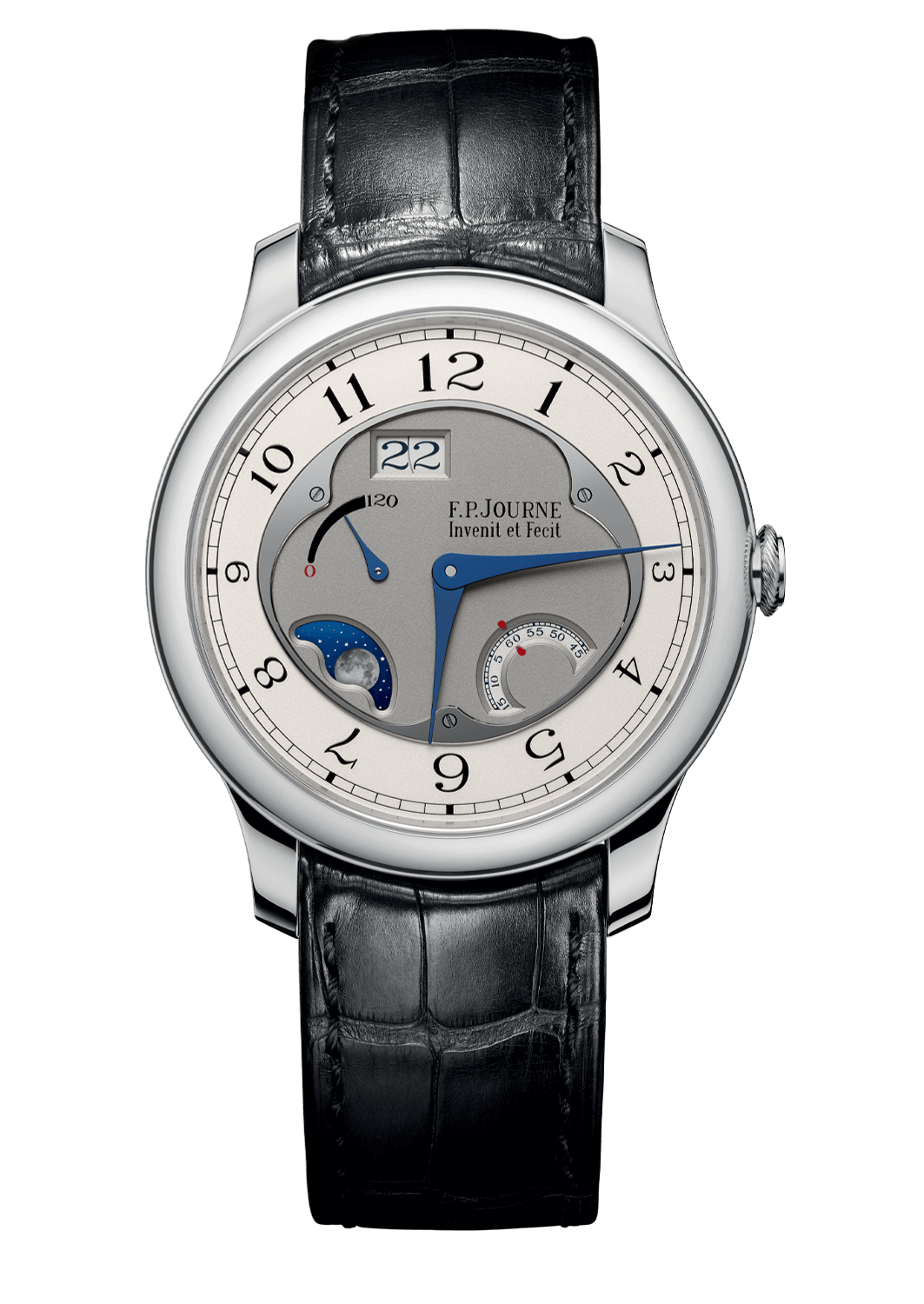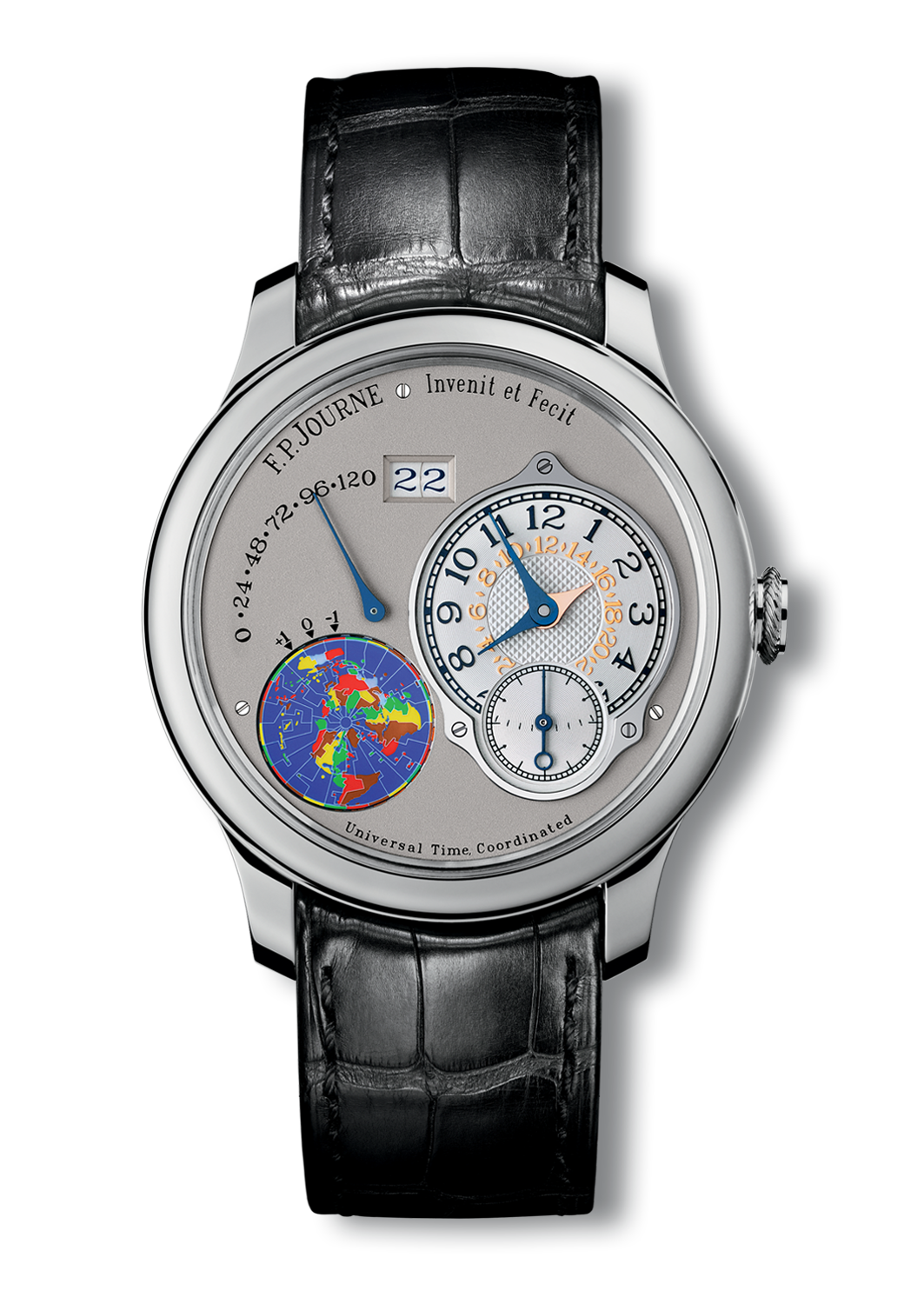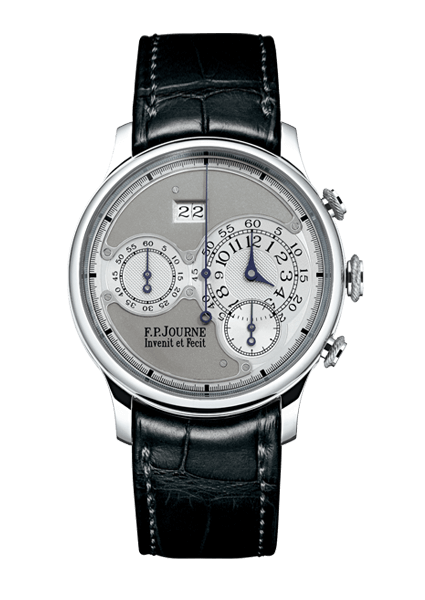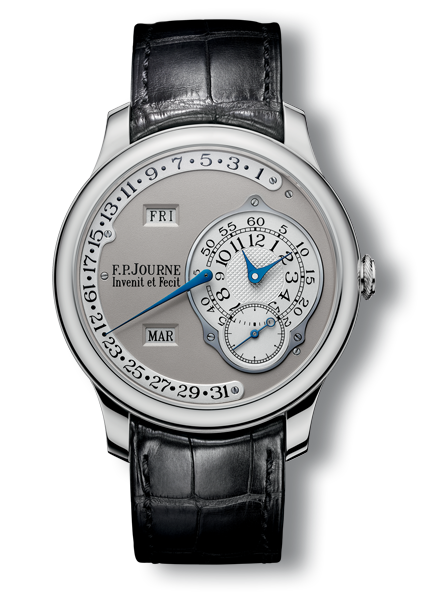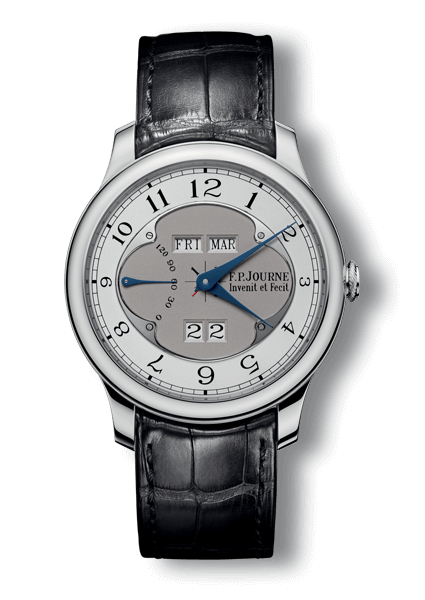Calibre 1300.3 https://www.fpjourne.com/en/collection/octa-collection/divine FP Journe https://www.fpjourne.com/en FP Journe

Diameter: 40 or 42 mm
Overall height: 10.7 mm
Dial: white Gold and whitened Silver
Hands: blued Steel
Technical Specifications
Central hours and minutes
Small second at 4h30
Large Date
Power reserve at 10h00
Moon phase
- Overall diameter : 30.80 mm
- Casing-up diameter : 30.40 mm
- Overall Height : 5.90 mm
- Height of winding stem : 3.00 mm
- Diameter of stem thread : S0.90mm
In-line lever escapement, 15-tooth wheel
Balance with 4 inertia weights
Flat Anachron microflamed spring
Mobile stud holder
Free-sprung balance
Nivatronic laser-welded to the collet
Pinned GE stud
Three-position crown
Slipping mainspring
Off-centre winding rotor
274 anti clock-wise rotations per 24 hours
Uni-directional automatic winding
Instantaneous date change
Date and moon setting by turning crown in opposite ways (position 2)
Time setting with crown in position 3
21'600 Alt/h, 3 Hz
Inertia: 10.10 mgcm2
Angle of lift: 52°
12 h dial up : 280°
90 h dial up : 220°
160 ± 10 hours
36
High grade
Circular stripes on the bridges
Baseplate partly circular grained
Polished screw heads with chamfered slots
Pegs with polished rounded ends
Steelwork with polished chamfers and straight graining
Movement: 271
Cased up with strap: 308
Central hours and minutes
Small second at 4h30
Large Date
Power reserve at 10h00
Moon phase
- Overall diameter : 30.80 mm
- Casing-up diameter : 30.40 mm
- Overall Height : 5.90 mm
- Height of winding stem : 3.00 mm
- Diameter of stem thread : S0.90mm
In-line lever escapement, 15-tooth wheel
Balance with 4 inertia weights
Flat Anachron microflamed spring
Mobile stud holder
Free-sprung balance
Nivatronic laser-welded to the collet
Pinned GE stud
Three-position crown
Slipping mainspring
Off-centre winding rotor
274 anti clock-wise rotations per 24 hours
Uni-directional automatic winding
Instantaneous date change
Date and moon setting by turning crown in opposite ways (position 2)
Time setting with crown in position 3
21'600 Alt/h, 3 Hz
Inertia: 10.10 mgcm2
Angle of lift: 52°
12 h dial up : 280°
90 h dial up : 220°
160 ± 10 hours
36
High grade
Circular stripes on the bridges
Baseplate partly circular grained
Polished screw heads with chamfered slots
Pegs with polished rounded ends
Steelwork with polished chamfers and straight graining
Movement: 271
Cased up with strap: 308
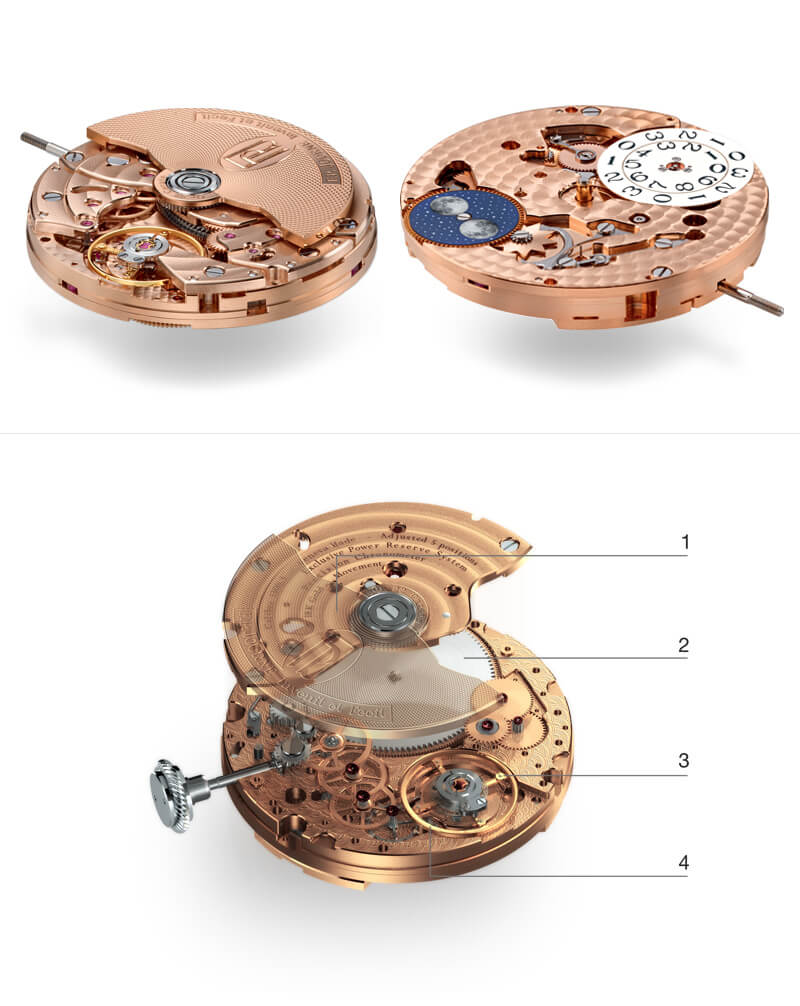
Technical description
(1) 22K Gold rotor with uni-directional winding
(2) Large capacity mainspring barrel
(3) Precision-adjustment weights
(4) Full-size free-sprung chronometer balance
Watches with long power reserves have hitherto been handicapped by small balances which are susceptible to shocks and disturbances. The Octa's compact construction allows a large (10.1 mm) balance to be fitted, giving greater inertia and stability. The free-sprung chronometer balance is adjusted by five turning weights that vibrate at a steady 21'600 times an hour.
Fully wound, the Octa delivers chronometric precision for 120 hours. The meter-long mainspring supplies an average 850gr of torque, limiting the loss in balance amplitude to 25% over the five-day period. Beyond that time, the watch will continue to go for another day or two, but the amplitude-loss no longer guarantees precision timekeeping.

Technical description
(1) 22K Gold rotor with uni-directional winding
(2) Large capacity mainspring barrel
(3) Precision-adjustment weights
(4) Full-size free-sprung chronometer balance
Watches with long power reserves have hitherto been handicapped by small balances which are susceptible to shocks and disturbances. The Octa's compact construction allows a large (10.1 mm) balance to be fitted, giving greater inertia and stability. The free-sprung chronometer balance is adjusted by five turning weights that vibrate at a steady 21'600 times an hour.
Fully wound, the Octa delivers chronometric precision for 120 hours. The meter-long mainspring supplies an average 850gr of torque, limiting the loss in balance amplitude to 25% over the five-day period. Beyond that time, the watch will continue to go for another day or two, but the amplitude-loss no longer guarantees precision timekeeping.

Diameter: 40 or 42 mm
Overall height: 10.7 mm
Dial: 5N Gold and whitened Silver
Hands: blued Steel
Technical Specifications
Central hours and minutes
Small second at 4h30
Large Date
Power reserve at 10h00
Moon phase
- Overall diameter : 30.80 mm
- Casing-up diameter : 30.40 mm
- Overall Height : 5.90 mm
- Height of winding stem : 3.00 mm
- Diameter of stem thread : S0.90mm
In-line lever escapement, 15-tooth wheel
Balance with 4 inertia weights
Flat Anachron microflamed spring
Mobile stud holder
Free-sprung balance
Nivatronic laser-welded to the collet
Pinned GE stud
Three-position crown
Slipping mainspring
Off-centre winding rotor
274 anti clock-wise rotations per 24 hours
Uni-directional automatic winding
Instantaneous date change
Date and moon setting by turning crown in opposite ways (position 2)
Time setting with crown in position 3
21'600 Alt/h, 3 Hz
Inertia: 10.10 mgcm2
Angle of lift: 52°
12 h dial up : 280°
90 h dial up : 220°
160 ± 10 hours
36
High grade
Circular stripes on the bridges
Baseplate partly circular grained
Polished screw heads with chamfered slots
Pegs with polished rounded ends
Steelwork with polished chamfers and straight graining
Movement: 271
Cased up with strap: 308
Central hours and minutes
Small second at 4h30
Large Date
Power reserve at 10h00
Moon phase
- Overall diameter : 30.80 mm
- Casing-up diameter : 30.40 mm
- Overall Height : 5.90 mm
- Height of winding stem : 3.00 mm
- Diameter of stem thread : S0.90mm
In-line lever escapement, 15-tooth wheel
Balance with 4 inertia weights
Flat Anachron microflamed spring
Mobile stud holder
Free-sprung balance
Nivatronic laser-welded to the collet
Pinned GE stud
Three-position crown
Slipping mainspring
Off-centre winding rotor
274 anti clock-wise rotations per 24 hours
Uni-directional automatic winding
Instantaneous date change
Date and moon setting by turning crown in opposite ways (position 2)
Time setting with crown in position 3
21'600 Alt/h, 3 Hz
Inertia: 10.10 mgcm2
Angle of lift: 52°
12 h dial up : 280°
90 h dial up : 220°
160 ± 10 hours
36
High grade
Circular stripes on the bridges
Baseplate partly circular grained
Polished screw heads with chamfered slots
Pegs with polished rounded ends
Steelwork with polished chamfers and straight graining
Movement: 271
Cased up with strap: 308

Technical description
(1) 22K Gold rotor with uni-directional winding
(2) Large capacity mainspring barrel
(3) Precision-adjustment weights
(4) Full-size free-sprung chronometer balance
Watches with long power reserves have hitherto been handicapped by small balances which are susceptible to shocks and disturbances. The Octa's compact construction allows a large (10.1 mm) balance to be fitted, giving greater inertia and stability. The free-sprung chronometer balance is adjusted by five turning weights that vibrate at a steady 21'600 times an hour.
Fully wound, the Octa delivers chronometric precision for 120 hours. The meter-long mainspring supplies an average 850gr of torque, limiting the loss in balance amplitude to 25% over the five-day period. Beyond that time, the watch will continue to go for another day or two, but the amplitude-loss no longer guarantees precision timekeeping.

Technical description
(1) 22K Gold rotor with uni-directional winding
(2) Large capacity mainspring barrel
(3) Precision-adjustment weights
(4) Full-size free-sprung chronometer balance
Watches with long power reserves have hitherto been handicapped by small balances which are susceptible to shocks and disturbances. The Octa's compact construction allows a large (10.1 mm) balance to be fitted, giving greater inertia and stability. The free-sprung chronometer balance is adjusted by five turning weights that vibrate at a steady 21'600 times an hour.
Fully wound, the Octa delivers chronometric precision for 120 hours. The meter-long mainspring supplies an average 850gr of torque, limiting the loss in balance amplitude to 25% over the five-day period. Beyond that time, the watch will continue to go for another day or two, but the amplitude-loss no longer guarantees precision timekeeping.

Diameter: 40 or 42 mm
Overall height: 10.7 mm
Dial: white Gold and whitened Silver
Hands: blued Steel
Technical Specifications
Central hours and minutes
Small second at 4h30
Large Date
Power reserve at 10h00
Moon phase
- Overall diameter : 30.80 mm
- Casing-up diameter : 30.40 mm
- Overall Height : 5.90 mm
- Height of winding stem : 3.00 mm
- Diameter of stem thread : S0.90mm
In-line lever escapement, 15-tooth wheel
Balance with 4 inertia weights
Flat Anachron microflamed spring
Mobile stud holder
Free-sprung balance
Nivatronic laser-welded to the collet
Pinned GE stud
Three-position crown
Slipping mainspring
Off-centre winding rotor
274 anti clock-wise rotations per 24 hours
Uni-directional automatic winding
Instantaneous date change
Date and moon setting by turning crown in opposite ways (position 2)
Time setting with crown in position 3
21'600 Alt/h, 3 Hz
Inertia: 10.10 mgcm2
Angle of lift: 52°
12 h dial up : 280°
90 h dial up : 220°
160 ± 10 hours
36
High grade
Circular stripes on the bridges
Baseplate partly circular grained
Polished screw heads with chamfered slots
Pegs with polished rounded ends
Steelwork with polished chamfers and straight graining
Movement: 271
Cased up with strap: 308
Central hours and minutes
Small second at 4h30
Large Date
Power reserve at 10h00
Moon phase
- Overall diameter : 30.80 mm
- Casing-up diameter : 30.40 mm
- Overall Height : 5.90 mm
- Height of winding stem : 3.00 mm
- Diameter of stem thread : S0.90mm
In-line lever escapement, 15-tooth wheel
Balance with 4 inertia weights
Flat Anachron microflamed spring
Mobile stud holder
Free-sprung balance
Nivatronic laser-welded to the collet
Pinned GE stud
Three-position crown
Slipping mainspring
Off-centre winding rotor
274 anti clock-wise rotations per 24 hours
Uni-directional automatic winding
Instantaneous date change
Date and moon setting by turning crown in opposite ways (position 2)
Time setting with crown in position 3
21'600 Alt/h, 3 Hz
Inertia: 10.10 mgcm2
Angle of lift: 52°
12 h dial up : 280°
90 h dial up : 220°
160 ± 10 hours
36
High grade
Circular stripes on the bridges
Baseplate partly circular grained
Polished screw heads with chamfered slots
Pegs with polished rounded ends
Steelwork with polished chamfers and straight graining
Movement: 271
Cased up with strap: 308

Technical description
(1) 22K Gold rotor with uni-directional winding
(2) Large capacity mainspring barrel
(3) Precision-adjustment weights
(4) Full-size free-sprung chronometer balance
Watches with long power reserves have hitherto been handicapped by small balances which are susceptible to shocks and disturbances. The Octa's compact construction allows a large (10.1 mm) balance to be fitted, giving greater inertia and stability. The free-sprung chronometer balance is adjusted by five turning weights that vibrate at a steady 21'600 times an hour.
Fully wound, the Octa delivers chronometric precision for 120 hours. The meter-long mainspring supplies an average 850gr of torque, limiting the loss in balance amplitude to 25% over the five-day period. Beyond that time, the watch will continue to go for another day or two, but the amplitude-loss no longer guarantees precision timekeeping.

Technical description
(1) 22K Gold rotor with uni-directional winding
(2) Large capacity mainspring barrel
(3) Precision-adjustment weights
(4) Full-size free-sprung chronometer balance
Watches with long power reserves have hitherto been handicapped by small balances which are susceptible to shocks and disturbances. The Octa's compact construction allows a large (10.1 mm) balance to be fitted, giving greater inertia and stability. The free-sprung chronometer balance is adjusted by five turning weights that vibrate at a steady 21'600 times an hour.
Fully wound, the Octa delivers chronometric precision for 120 hours. The meter-long mainspring supplies an average 850gr of torque, limiting the loss in balance amplitude to 25% over the five-day period. Beyond that time, the watch will continue to go for another day or two, but the amplitude-loss no longer guarantees precision timekeeping.

Diameter: 40 or 42 mm
Overall height: 10.7 mm
Dial: 5N Gold and whitened Silver
Hands: blued Steel
Technical Specifications
Central hours and minutes
Small second at 4h30
Large Date
Power reserve at 10h00
Moon phase
- Overall diameter : 30.80 mm
- Casing-up diameter : 30.40 mm
- Overall Height : 5.90 mm
- Height of winding stem : 3.00 mm
- Diameter of stem thread : S0.90mm
In-line lever escapement, 15-tooth wheel
Balance with 4 inertia weights
Flat Anachron microflamed spring
Mobile stud holder
Free-sprung balance
Nivatronic laser-welded to the collet
Pinned GE stud
Three-position crown
Slipping mainspring
Off-centre winding rotor
274 anti clock-wise rotations per 24 hours
Uni-directional automatic winding
Instantaneous date change
Date and moon setting by turning crown in opposite ways (position 2)
Time setting with crown in position 3
21'600 Alt/h, 3 Hz
Inertia: 10.10 mgcm2
Angle of lift: 52°
12 h dial up : 280°
90 h dial up : 220°
160 ± 10 hours
36
High grade
Circular stripes on the bridges
Baseplate partly circular grained
Polished screw heads with chamfered slots
Pegs with polished rounded ends
Steelwork with polished chamfers and straight graining
Movement: 271
Cased up with strap: 308
Central hours and minutes
Small second at 4h30
Large Date
Power reserve at 10h00
Moon phase
- Overall diameter : 30.80 mm
- Casing-up diameter : 30.40 mm
- Overall Height : 5.90 mm
- Height of winding stem : 3.00 mm
- Diameter of stem thread : S0.90mm
In-line lever escapement, 15-tooth wheel
Balance with 4 inertia weights
Flat Anachron microflamed spring
Mobile stud holder
Free-sprung balance
Nivatronic laser-welded to the collet
Pinned GE stud
Three-position crown
Slipping mainspring
Off-centre winding rotor
274 anti clock-wise rotations per 24 hours
Uni-directional automatic winding
Instantaneous date change
Date and moon setting by turning crown in opposite ways (position 2)
Time setting with crown in position 3
21'600 Alt/h, 3 Hz
Inertia: 10.10 mgcm2
Angle of lift: 52°
12 h dial up : 280°
90 h dial up : 220°
160 ± 10 hours
36
High grade
Circular stripes on the bridges
Baseplate partly circular grained
Polished screw heads with chamfered slots
Pegs with polished rounded ends
Steelwork with polished chamfers and straight graining
Movement: 271
Cased up with strap: 308

Technical description
(1) 22K Gold rotor with uni-directional winding
(2) Large capacity mainspring barrel
(3) Precision-adjustment weights
(4) Full-size free-sprung chronometer balance
Watches with long power reserves have hitherto been handicapped by small balances which are susceptible to shocks and disturbances. The Octa's compact construction allows a large (10.1 mm) balance to be fitted, giving greater inertia and stability. The free-sprung chronometer balance is adjusted by five turning weights that vibrate at a steady 21'600 times an hour.
Fully wound, the Octa delivers chronometric precision for 120 hours. The meter-long mainspring supplies an average 850gr of torque, limiting the loss in balance amplitude to 25% over the five-day period. Beyond that time, the watch will continue to go for another day or two, but the amplitude-loss no longer guarantees precision timekeeping.

Technical description
(1) 22K Gold rotor with uni-directional winding
(2) Large capacity mainspring barrel
(3) Precision-adjustment weights
(4) Full-size free-sprung chronometer balance
Watches with long power reserves have hitherto been handicapped by small balances which are susceptible to shocks and disturbances. The Octa's compact construction allows a large (10.1 mm) balance to be fitted, giving greater inertia and stability. The free-sprung chronometer balance is adjusted by five turning weights that vibrate at a steady 21'600 times an hour.
Fully wound, the Octa delivers chronometric precision for 120 hours. The meter-long mainspring supplies an average 850gr of torque, limiting the loss in balance amplitude to 25% over the five-day period. Beyond that time, the watch will continue to go for another day or two, but the amplitude-loss no longer guarantees precision timekeeping.
Diameter: 40 or 42 mm
Overall height: 10.7 mm
Dial: white Gold and whitened Silver
Hands: blued Steel

Diameter: 40 or 42 mm
Overall height: 10.7 mm
Dial: white Gold and whitened Silver
Hands: blued Steel
Technical Specifications
Central hours and minutes
Small second at 4h30
Large Date
Power reserve at 10h00
Moon phase
- Overall diameter : 30.80 mm
- Casing-up diameter : 30.40 mm
- Overall Height : 5.90 mm
- Height of winding stem : 3.00 mm
- Diameter of stem thread : S0.90mm
In-line lever escapement, 15-tooth wheel
Balance with 4 inertia weights
Flat Anachron microflamed spring
Mobile stud holder
Free-sprung balance
Nivatronic laser-welded to the collet
Pinned GE stud
Three-position crown
Slipping mainspring
Off-centre winding rotor
274 anti clock-wise rotations per 24 hours
Uni-directional automatic winding
Instantaneous date change
Date and moon setting by turning crown in opposite ways (position 2)
Time setting with crown in position 3
21'600 Alt/h, 3 Hz
Inertia: 10.10 mgcm2
Angle of lift: 52°
12 h dial up : 280°
90 h dial up : 220°
160 ± 10 hours
36
High grade
Circular stripes on the bridges
Baseplate partly circular grained
Polished screw heads with chamfered slots
Pegs with polished rounded ends
Steelwork with polished chamfers and straight graining
Movement: 271
Cased up with strap: 308
Central hours and minutes
Small second at 4h30
Large Date
Power reserve at 10h00
Moon phase
- Overall diameter : 30.80 mm
- Casing-up diameter : 30.40 mm
- Overall Height : 5.90 mm
- Height of winding stem : 3.00 mm
- Diameter of stem thread : S0.90mm
In-line lever escapement, 15-tooth wheel
Balance with 4 inertia weights
Flat Anachron microflamed spring
Mobile stud holder
Free-sprung balance
Nivatronic laser-welded to the collet
Pinned GE stud
Three-position crown
Slipping mainspring
Off-centre winding rotor
274 anti clock-wise rotations per 24 hours
Uni-directional automatic winding
Instantaneous date change
Date and moon setting by turning crown in opposite ways (position 2)
Time setting with crown in position 3
21'600 Alt/h, 3 Hz
Inertia: 10.10 mgcm2
Angle of lift: 52°
12 h dial up : 280°
90 h dial up : 220°
160 ± 10 hours
36
High grade
Circular stripes on the bridges
Baseplate partly circular grained
Polished screw heads with chamfered slots
Pegs with polished rounded ends
Steelwork with polished chamfers and straight graining
Movement: 271
Cased up with strap: 308

Technical description
(1) 22K Gold rotor with uni-directional winding
(2) Large capacity mainspring barrel
(3) Precision-adjustment weights
(4) Full-size free-sprung chronometer balance
Watches with long power reserves have hitherto been handicapped by small balances which are susceptible to shocks and disturbances. The Octa's compact construction allows a large (10.1 mm) balance to be fitted, giving greater inertia and stability. The free-sprung chronometer balance is adjusted by five turning weights that vibrate at a steady 21'600 times an hour.
Fully wound, the Octa delivers chronometric precision for 120 hours. The meter-long mainspring supplies an average 850gr of torque, limiting the loss in balance amplitude to 25% over the five-day period. Beyond that time, the watch will continue to go for another day or two, but the amplitude-loss no longer guarantees precision timekeeping.

Technical description
(1) 22K Gold rotor with uni-directional winding
(2) Large capacity mainspring barrel
(3) Precision-adjustment weights
(4) Full-size free-sprung chronometer balance
Watches with long power reserves have hitherto been handicapped by small balances which are susceptible to shocks and disturbances. The Octa's compact construction allows a large (10.1 mm) balance to be fitted, giving greater inertia and stability. The free-sprung chronometer balance is adjusted by five turning weights that vibrate at a steady 21'600 times an hour.
Fully wound, the Octa delivers chronometric precision for 120 hours. The meter-long mainspring supplies an average 850gr of torque, limiting the loss in balance amplitude to 25% over the five-day period. Beyond that time, the watch will continue to go for another day or two, but the amplitude-loss no longer guarantees precision timekeeping.

Diameter: 40 or 42 mm
Overall height: 10.7 mm
Dial: 5N Gold and whitened Silver
Hands: blued Steel
Technical Specifications
Central hours and minutes
Small second at 4h30
Large Date
Power reserve at 10h00
Moon phase
- Overall diameter : 30.80 mm
- Casing-up diameter : 30.40 mm
- Overall Height : 5.90 mm
- Height of winding stem : 3.00 mm
- Diameter of stem thread : S0.90mm
In-line lever escapement, 15-tooth wheel
Balance with 4 inertia weights
Flat Anachron microflamed spring
Mobile stud holder
Free-sprung balance
Nivatronic laser-welded to the collet
Pinned GE stud
Three-position crown
Slipping mainspring
Off-centre winding rotor
274 anti clock-wise rotations per 24 hours
Uni-directional automatic winding
Instantaneous date change
Date and moon setting by turning crown in opposite ways (position 2)
Time setting with crown in position 3
21'600 Alt/h, 3 Hz
Inertia: 10.10 mgcm2
Angle of lift: 52°
12 h dial up : 280°
90 h dial up : 220°
160 ± 10 hours
36
High grade
Circular stripes on the bridges
Baseplate partly circular grained
Polished screw heads with chamfered slots
Pegs with polished rounded ends
Steelwork with polished chamfers and straight graining
Movement: 271
Cased up with strap: 308
Central hours and minutes
Small second at 4h30
Large Date
Power reserve at 10h00
Moon phase
- Overall diameter : 30.80 mm
- Casing-up diameter : 30.40 mm
- Overall Height : 5.90 mm
- Height of winding stem : 3.00 mm
- Diameter of stem thread : S0.90mm
In-line lever escapement, 15-tooth wheel
Balance with 4 inertia weights
Flat Anachron microflamed spring
Mobile stud holder
Free-sprung balance
Nivatronic laser-welded to the collet
Pinned GE stud
Three-position crown
Slipping mainspring
Off-centre winding rotor
274 anti clock-wise rotations per 24 hours
Uni-directional automatic winding
Instantaneous date change
Date and moon setting by turning crown in opposite ways (position 2)
Time setting with crown in position 3
21'600 Alt/h, 3 Hz
Inertia: 10.10 mgcm2
Angle of lift: 52°
12 h dial up : 280°
90 h dial up : 220°
160 ± 10 hours
36
High grade
Circular stripes on the bridges
Baseplate partly circular grained
Polished screw heads with chamfered slots
Pegs with polished rounded ends
Steelwork with polished chamfers and straight graining
Movement: 271
Cased up with strap: 308

Technical description
(1) 22K Gold rotor with uni-directional winding
(2) Large capacity mainspring barrel
(3) Precision-adjustment weights
(4) Full-size free-sprung chronometer balance
Watches with long power reserves have hitherto been handicapped by small balances which are susceptible to shocks and disturbances. The Octa's compact construction allows a large (10.1 mm) balance to be fitted, giving greater inertia and stability. The free-sprung chronometer balance is adjusted by five turning weights that vibrate at a steady 21'600 times an hour.
Fully wound, the Octa delivers chronometric precision for 120 hours. The meter-long mainspring supplies an average 850gr of torque, limiting the loss in balance amplitude to 25% over the five-day period. Beyond that time, the watch will continue to go for another day or two, but the amplitude-loss no longer guarantees precision timekeeping.

Technical description
(1) 22K Gold rotor with uni-directional winding
(2) Large capacity mainspring barrel
(3) Precision-adjustment weights
(4) Full-size free-sprung chronometer balance
Watches with long power reserves have hitherto been handicapped by small balances which are susceptible to shocks and disturbances. The Octa's compact construction allows a large (10.1 mm) balance to be fitted, giving greater inertia and stability. The free-sprung chronometer balance is adjusted by five turning weights that vibrate at a steady 21'600 times an hour.
Fully wound, the Octa delivers chronometric precision for 120 hours. The meter-long mainspring supplies an average 850gr of torque, limiting the loss in balance amplitude to 25% over the five-day period. Beyond that time, the watch will continue to go for another day or two, but the amplitude-loss no longer guarantees precision timekeeping.

Diameter: 40 or 42 mm
Overall height: 10.7 mm
Dial: white Gold and whitened Silver
Hands: blued Steel
Technical Specifications
Central hours and minutes
Small second at 4h30
Large Date
Power reserve at 10h00
Moon phase
- Overall diameter : 30.80 mm
- Casing-up diameter : 30.40 mm
- Overall Height : 5.90 mm
- Height of winding stem : 3.00 mm
- Diameter of stem thread : S0.90mm
In-line lever escapement, 15-tooth wheel
Balance with 4 inertia weights
Flat Anachron microflamed spring
Mobile stud holder
Free-sprung balance
Nivatronic laser-welded to the collet
Pinned GE stud
Three-position crown
Slipping mainspring
Off-centre winding rotor
274 anti clock-wise rotations per 24 hours
Uni-directional automatic winding
Instantaneous date change
Date and moon setting by turning crown in opposite ways (position 2)
Time setting with crown in position 3
21'600 Alt/h, 3 Hz
Inertia: 10.10 mgcm2
Angle of lift: 52°
12 h dial up : 280°
90 h dial up : 220°
160 ± 10 hours
36
High grade
Circular stripes on the bridges
Baseplate partly circular grained
Polished screw heads with chamfered slots
Pegs with polished rounded ends
Steelwork with polished chamfers and straight graining
Movement: 271
Cased up with strap: 308
Central hours and minutes
Small second at 4h30
Large Date
Power reserve at 10h00
Moon phase
- Overall diameter : 30.80 mm
- Casing-up diameter : 30.40 mm
- Overall Height : 5.90 mm
- Height of winding stem : 3.00 mm
- Diameter of stem thread : S0.90mm
In-line lever escapement, 15-tooth wheel
Balance with 4 inertia weights
Flat Anachron microflamed spring
Mobile stud holder
Free-sprung balance
Nivatronic laser-welded to the collet
Pinned GE stud
Three-position crown
Slipping mainspring
Off-centre winding rotor
274 anti clock-wise rotations per 24 hours
Uni-directional automatic winding
Instantaneous date change
Date and moon setting by turning crown in opposite ways (position 2)
Time setting with crown in position 3
21'600 Alt/h, 3 Hz
Inertia: 10.10 mgcm2
Angle of lift: 52°
12 h dial up : 280°
90 h dial up : 220°
160 ± 10 hours
36
High grade
Circular stripes on the bridges
Baseplate partly circular grained
Polished screw heads with chamfered slots
Pegs with polished rounded ends
Steelwork with polished chamfers and straight graining
Movement: 271
Cased up with strap: 308

Technical description
(1) 22K Gold rotor with uni-directional winding
(2) Large capacity mainspring barrel
(3) Precision-adjustment weights
(4) Full-size free-sprung chronometer balance
Watches with long power reserves have hitherto been handicapped by small balances which are susceptible to shocks and disturbances. The Octa's compact construction allows a large (10.1 mm) balance to be fitted, giving greater inertia and stability. The free-sprung chronometer balance is adjusted by five turning weights that vibrate at a steady 21'600 times an hour.
Fully wound, the Octa delivers chronometric precision for 120 hours. The meter-long mainspring supplies an average 850gr of torque, limiting the loss in balance amplitude to 25% over the five-day period. Beyond that time, the watch will continue to go for another day or two, but the amplitude-loss no longer guarantees precision timekeeping.

Technical description
(1) 22K Gold rotor with uni-directional winding
(2) Large capacity mainspring barrel
(3) Precision-adjustment weights
(4) Full-size free-sprung chronometer balance
Watches with long power reserves have hitherto been handicapped by small balances which are susceptible to shocks and disturbances. The Octa's compact construction allows a large (10.1 mm) balance to be fitted, giving greater inertia and stability. The free-sprung chronometer balance is adjusted by five turning weights that vibrate at a steady 21'600 times an hour.
Fully wound, the Octa delivers chronometric precision for 120 hours. The meter-long mainspring supplies an average 850gr of torque, limiting the loss in balance amplitude to 25% over the five-day period. Beyond that time, the watch will continue to go for another day or two, but the amplitude-loss no longer guarantees precision timekeeping.

Diameter: 40 or 42 mm
Overall height: 10.7 mm
Dial: 5N Gold and whitened Silver
Hands: blued Steel
Technical Specifications
Central hours and minutes
Small second at 4h30
Large Date
Power reserve at 10h00
Moon phase
- Overall diameter : 30.80 mm
- Casing-up diameter : 30.40 mm
- Overall Height : 5.90 mm
- Height of winding stem : 3.00 mm
- Diameter of stem thread : S0.90mm
In-line lever escapement, 15-tooth wheel
Balance with 4 inertia weights
Flat Anachron microflamed spring
Mobile stud holder
Free-sprung balance
Nivatronic laser-welded to the collet
Pinned GE stud
Three-position crown
Slipping mainspring
Off-centre winding rotor
274 anti clock-wise rotations per 24 hours
Uni-directional automatic winding
Instantaneous date change
Date and moon setting by turning crown in opposite ways (position 2)
Time setting with crown in position 3
21'600 Alt/h, 3 Hz
Inertia: 10.10 mgcm2
Angle of lift: 52°
12 h dial up : 280°
90 h dial up : 220°
160 ± 10 hours
36
High grade
Circular stripes on the bridges
Baseplate partly circular grained
Polished screw heads with chamfered slots
Pegs with polished rounded ends
Steelwork with polished chamfers and straight graining
Movement: 271
Cased up with strap: 308
Central hours and minutes
Small second at 4h30
Large Date
Power reserve at 10h00
Moon phase
- Overall diameter : 30.80 mm
- Casing-up diameter : 30.40 mm
- Overall Height : 5.90 mm
- Height of winding stem : 3.00 mm
- Diameter of stem thread : S0.90mm
In-line lever escapement, 15-tooth wheel
Balance with 4 inertia weights
Flat Anachron microflamed spring
Mobile stud holder
Free-sprung balance
Nivatronic laser-welded to the collet
Pinned GE stud
Three-position crown
Slipping mainspring
Off-centre winding rotor
274 anti clock-wise rotations per 24 hours
Uni-directional automatic winding
Instantaneous date change
Date and moon setting by turning crown in opposite ways (position 2)
Time setting with crown in position 3
21'600 Alt/h, 3 Hz
Inertia: 10.10 mgcm2
Angle of lift: 52°
12 h dial up : 280°
90 h dial up : 220°
160 ± 10 hours
36
High grade
Circular stripes on the bridges
Baseplate partly circular grained
Polished screw heads with chamfered slots
Pegs with polished rounded ends
Steelwork with polished chamfers and straight graining
Movement: 271
Cased up with strap: 308

Technical description
(1) 22K Gold rotor with uni-directional winding
(2) Large capacity mainspring barrel
(3) Precision-adjustment weights
(4) Full-size free-sprung chronometer balance
Watches with long power reserves have hitherto been handicapped by small balances which are susceptible to shocks and disturbances. The Octa's compact construction allows a large (10.1 mm) balance to be fitted, giving greater inertia and stability. The free-sprung chronometer balance is adjusted by five turning weights that vibrate at a steady 21'600 times an hour.
Fully wound, the Octa delivers chronometric precision for 120 hours. The meter-long mainspring supplies an average 850gr of torque, limiting the loss in balance amplitude to 25% over the five-day period. Beyond that time, the watch will continue to go for another day or two, but the amplitude-loss no longer guarantees precision timekeeping.

Technical description
(1) 22K Gold rotor with uni-directional winding
(2) Large capacity mainspring barrel
(3) Precision-adjustment weights
(4) Full-size free-sprung chronometer balance
Watches with long power reserves have hitherto been handicapped by small balances which are susceptible to shocks and disturbances. The Octa's compact construction allows a large (10.1 mm) balance to be fitted, giving greater inertia and stability. The free-sprung chronometer balance is adjusted by five turning weights that vibrate at a steady 21'600 times an hour.
Fully wound, the Octa delivers chronometric precision for 120 hours. The meter-long mainspring supplies an average 850gr of torque, limiting the loss in balance amplitude to 25% over the five-day period. Beyond that time, the watch will continue to go for another day or two, but the amplitude-loss no longer guarantees precision timekeeping.
About
The F.P.JOURNE DIVINE has a mechanical movement with automatic winding, manufactured in 18K rose Gold, built on the exclusive Calibre Octa 1300.3. It has made its mark as the first automatic movement with a power reserve sufficient to insure precision timekeeping for over five days or 120 h (EFFECTIVE power reserve: 160 h ± 10 h). It is wound unidirectionally by the exclusive off-centre F.P.JOURNE ROTOR IN 22K 5N Gold, using A SELF-LOCKING BALL BEARING SYSTEM for unequalled efficiency. EVERY INFINITESIMAL MOVEMENT OF THE WRIST IS THUS MAXIMALLY EXPLOITED FOR AN OPTIMISED WINDING OF THE WATCH. THE VARIABLE INERTIA BALANCE WHEEL ENSURES AN OPTIMUM YIELD THAT OFFERS AN IRREPROACHABLE STABILITY.
THE INSTANTANEOUS LARGE DATE IS DISPLAYED IN ENLARGED WINDOWS THAT STAND OUT AGAINST THE GOLD DIAL WHERE THE SECONDS DISK DISPLAY AND THE RETROGRADE POWER RESERVE INDICATOR with a 120-hour scale ARE SUBTLY DELINEATED.
THE ELEGANT SAPPHIRE MOON PHASE DISK, THE DELICATE BLUED STEEL HANDS, AND THE STREAMLINED POLISHED STEEL CIRCLE SCREWED TO THE DIAL ARE ALL EXCLUSIVE CHARACTERISTICS OF F.P.JOURNE.
A SPARK OF WHIMSY IS ADDED BY THE DIFFERENT SIZED NUMERALS OF THE HOURS RING, WHILE RED DOTS ENLIVEN THE RESOLUTELY CONTEMPORARY AESTHETICS OF THE DIAL.
Finally, the moonphase complication offers a link to ancient times, when the full moon was the only source of light during the night and instrumental in navigation and the rise of civilization. While today we no longer depend on moonlight for navigation, the moonphase remains one of the most poetic of all complications, giving an alternative perspective of the passage of time.
A SPECIFIC WHEEL TRAIN ALLOWS PRECISE MOON PHASE INDICATIONS. ADJUSTING THE INDICATIONS IS DONE VIA THE CROWN, WHICH MAKES IT VERY EASY TO USE.
A horological ideal
“The construction of the Octa calibre has less powerful ties with horological history than do the constant-force device or resonance models, but it symbolises an horological ideal of giving timekeepers the highest possible degree of precision and autonomy!
One can indeed note the fact that if church clocks are placed so high, in addition to enhancing visibility, it was mostly because it often took an entire month for the driving-weights to drop the length of their cords. Numerous systems were invented to increase the operating duration of timekeeping devices, meeting with various degrees of success. Given the small volume of a wristwatch, the size of the mainspring was automatically limited. Watchmakers therefore discovered the trick of adding an extra wheel to the customary geartrain in order to extend the duration of its development. Unfortunately, actually using this system, even with a stronger spring, led them to observe that the level of energy actually reaching the balance remained low. To compensate for this, they fitted a smaller balance using less energy, but which was also less stable. It is therefore not unusual to find that some watches able to run for several days display an extremely unpredictable level of precision.
This challenge was a powerful source of motivation! I then imagined that the best and the most obvious means of extending the running duration would be to extend the capacity of the spring development. The difficulty lay in integrating it on the same level as the gear-train and the escapement, given its stability: 1 metre and 1 millimetre thick. Thanks to the low torque of this spring, I could achieve extremely fast automatic winding (one and a half hours on a Chappuis cyclotest for over 5 days’ running).
Once the challenge of autonomy was thus successfully met with this automatic winding calibre, I knuckled down to the second challenge of managing to insert various complications into that same movement: power reserve with large date display, fly-back chronograph with large date display, retrograde annual calendar, etc… and of doing so while maintaining an identical size for all models.
Three years of research and development were required before this automatic winding movement that is unique in the world could be presented to the public.”
François-Paul Journe
Technical Specifications
Central hours and minutes
Small second at 4h30
Large Date
Power reserve at 10h00
Moon phase
- Overall diameter : 30.80 mm
- Casing-up diameter : 30.40 mm
- Overall Height : 5.90 mm
- Height of winding stem : 3.00 mm
- Diameter of stem thread : S0.90mm
In-line lever escapement, 15-tooth wheel
Balance with 4 inertia weights
Flat Anachron microflamed spring
Mobile stud holder
Free-sprung balance
Nivatronic laser-welded to the collet
Pinned GE stud
Three-position crown
Slipping mainspring
Off-centre winding rotor
274 anti clock-wise rotations per 24 hours
Uni-directional automatic winding
Instantaneous date change
Date and moon setting by turning crown in opposite ways (position 2)
Time setting with crown in position 3
21'600 Alt/h, 3 Hz
Inertia: 10.10 mgcm2
Angle of lift: 52°
12 h dial up : 280°
90 h dial up : 220°
160 ± 10 hours
36
High grade
Circular stripes on the bridges
Baseplate partly circular grained
Polished screw heads with chamfered slots
Pegs with polished rounded ends
Steelwork with polished chamfers and straight graining
Movement: 271
Cased up with strap: 308
Central hours and minutes
Small second at 4h30
Large Date
Power reserve at 10h00
Moon phase
- Overall diameter : 30.80 mm
- Casing-up diameter : 30.40 mm
- Overall Height : 5.90 mm
- Height of winding stem : 3.00 mm
- Diameter of stem thread : S0.90mm
In-line lever escapement, 15-tooth wheel
Balance with 4 inertia weights
Flat Anachron microflamed spring
Mobile stud holder
Free-sprung balance
Nivatronic laser-welded to the collet
Pinned GE stud
Three-position crown
Slipping mainspring
Off-centre winding rotor
274 anti clock-wise rotations per 24 hours
Uni-directional automatic winding
Instantaneous date change
Date and moon setting by turning crown in opposite ways (position 2)
Time setting with crown in position 3
21'600 Alt/h, 3 Hz
Inertia: 10.10 mgcm2
Angle of lift: 52°
12 h dial up : 280°
90 h dial up : 220°
160 ± 10 hours
36
High grade
Circular stripes on the bridges
Baseplate partly circular grained
Polished screw heads with chamfered slots
Pegs with polished rounded ends
Steelwork with polished chamfers and straight graining
Movement: 271
Cased up with strap: 308

Technical description
(1) 22K Gold rotor with uni-directional winding
(2) Large capacity mainspring barrel
(3) Precision-adjustment weights
(4) Full-size free-sprung chronometer balance
Watches with long power reserves have hitherto been handicapped by small balances which are susceptible to shocks and disturbances. The Octa's compact construction allows a large (10.1 mm) balance to be fitted, giving greater inertia and stability. The free-sprung chronometer balance is adjusted by five turning weights that vibrate at a steady 21'600 times an hour.
Fully wound, the Octa delivers chronometric precision for 120 hours. The meter-long mainspring supplies an average 850gr of torque, limiting the loss in balance amplitude to 25% over the five-day period. Beyond that time, the watch will continue to go for another day or two, but the amplitude-loss no longer guarantees precision timekeeping.

Technical description
(1) 22K Gold rotor with uni-directional winding
(2) Large capacity mainspring barrel
(3) Precision-adjustment weights
(4) Full-size free-sprung chronometer balance
Watches with long power reserves have hitherto been handicapped by small balances which are susceptible to shocks and disturbances. The Octa's compact construction allows a large (10.1 mm) balance to be fitted, giving greater inertia and stability. The free-sprung chronometer balance is adjusted by five turning weights that vibrate at a steady 21'600 times an hour.
Fully wound, the Octa delivers chronometric precision for 120 hours. The meter-long mainspring supplies an average 850gr of torque, limiting the loss in balance amplitude to 25% over the five-day period. Beyond that time, the watch will continue to go for another day or two, but the amplitude-loss no longer guarantees precision timekeeping.
-
About
THE F.P.JOURNE DIVINE MODEL FEATURES A NEW LOOK: ELEGANT, UNCLUTTERED, AND PERFECTLY LEGIBLE.
The F.P.JOURNE DIVINE has a mechanical movement with automatic winding, manufactured in 18K rose Gold, built on the exclusive Calibre Octa 1300.3. It has made its mark as the first automatic movement with a power reserve sufficient to insure precision timekeeping for over five days or 120 h (EFFECTIVE power reserve: 160 h ± 10 h). It is wound unidirectionally by the exclusive off-centre F.P.JOURNE ROTOR IN 22K 5N Gold, using A SELF-LOCKING BALL BEARING SYSTEM for unequalled efficiency. EVERY INFINITESIMAL MOVEMENT OF THE WRIST IS THUS MAXIMALLY EXPLOITED FOR AN OPTIMISED WINDING OF THE WATCH. THE VARIABLE INERTIA BALANCE WHEEL ENSURES AN OPTIMUM YIELD THAT OFFERS AN IRREPROACHABLE STABILITY.
THE INSTANTANEOUS LARGE DATE IS DISPLAYED IN ENLARGED WINDOWS THAT STAND OUT AGAINST THE GOLD DIAL WHERE THE SECONDS DISK DISPLAY AND THE RETROGRADE POWER RESERVE INDICATOR with a 120-hour scale ARE SUBTLY DELINEATED.
THE ELEGANT SAPPHIRE MOON PHASE DISK, THE DELICATE BLUED STEEL HANDS, AND THE STREAMLINED POLISHED STEEL CIRCLE SCREWED TO THE DIAL ARE ALL EXCLUSIVE CHARACTERISTICS OF F.P.JOURNE.
A SPARK OF WHIMSY IS ADDED BY THE DIFFERENT SIZED NUMERALS OF THE HOURS RING, WHILE RED DOTS ENLIVEN THE RESOLUTELY CONTEMPORARY AESTHETICS OF THE DIAL.
Finally, the moonphase complication offers a link to ancient times, when the full moon was the only source of light during the night and instrumental in navigation and the rise of civilization. While today we no longer depend on moonlight for navigation, the moonphase remains one of the most poetic of all complications, giving an alternative perspective of the passage of time.
A SPECIFIC WHEEL TRAIN ALLOWS PRECISE MOON PHASE INDICATIONS. ADJUSTING THE INDICATIONS IS DONE VIA THE CROWN, WHICH MAKES IT VERY EASY TO USE. -
Testimony
Calibre OCTA
A horological ideal
“The construction of the Octa calibre has less powerful ties with horological history than do the constant-force device or resonance models, but it symbolises an horological ideal of giving timekeepers the highest possible degree of precision and autonomy!
One can indeed note the fact that if church clocks are placed so high, in addition to enhancing visibility, it was mostly because it often took an entire month for the driving-weights to drop the length of their cords. Numerous systems were invented to increase the operating duration of timekeeping devices, meeting with various degrees of success. Given the small volume of a wristwatch, the size of the mainspring was automatically limited. Watchmakers therefore discovered the trick of adding an extra wheel to the customary geartrain in order to extend the duration of its development. Unfortunately, actually using this system, even with a stronger spring, led them to observe that the level of energy actually reaching the balance remained low. To compensate for this, they fitted a smaller balance using less energy, but which was also less stable. It is therefore not unusual to find that some watches able to run for several days display an extremely unpredictable level of precision.
This challenge was a powerful source of motivation! I then imagined that the best and the most obvious means of extending the running duration would be to extend the capacity of the spring development. The difficulty lay in integrating it on the same level as the gear-train and the escapement, given its stability: 1 metre and 1 millimetre thick. Thanks to the low torque of this spring, I could achieve extremely fast automatic winding (one and a half hours on a Chappuis cyclotest for over 5 days’ running).
Once the challenge of autonomy was thus successfully met with this automatic winding calibre, I knuckled down to the second challenge of managing to insert various complications into that same movement: power reserve with large date display, fly-back chronograph with large date display, retrograde annual calendar, etc… and of doing so while maintaining an identical size for all models.
Three years of research and development were required before this automatic winding movement that is unique in the world could be presented to the public.”
François-Paul Journe -
Technical description
Technical Specifications
Indications :Central hours and minutes
Small second at 4h30
Large Date
Power reserve at 10h00
Moon phaseDimensions :- Overall diameter : 30.80 mm
- Casing-up diameter : 30.40 mm
- Overall Height : 5.90 mm
- Height of winding stem : 3.00 mm
- Diameter of stem thread : S0.90mm
Particularities :In-line lever escapement, 15-tooth wheel
Balance with 4 inertia weights
Flat Anachron microflamed spring
Mobile stud holder
Free-sprung balance
Nivatronic laser-welded to the collet
Pinned GE stud
Three-position crown
Slipping mainspring
Off-centre winding rotorWinding Speed :274 anti clock-wise rotations per 24 hours
Features :Uni-directional automatic winding
Instantaneous date change
Date and moon setting by turning crown in opposite ways (position 2)
Time setting with crown in position 3Frequency :21'600 Alt/h, 3 Hz
Balance: :Inertia: 10.10 mgcm2
Angle of lift: 52°Amplitude :12 h dial up : 280°
90 h dial up : 220°Autonomy :160 ± 10 hours
Number of jewels :36
Decoration :High grade
Circular stripes on the bridges
Baseplate partly circular grained
Polished screw heads with chamfered slots
Pegs with polished rounded ends
Steelwork with polished chamfers and straight grainingNumber of pieces :Movement: 271
Cased up with strap: 308Indications :Central hours and minutes
Small second at 4h30
Large Date
Power reserve at 10h00
Moon phaseDimensions :- Overall diameter : 30.80 mm
- Casing-up diameter : 30.40 mm
- Overall Height : 5.90 mm
- Height of winding stem : 3.00 mm
- Diameter of stem thread : S0.90mm
Particularities :In-line lever escapement, 15-tooth wheel
Balance with 4 inertia weights
Flat Anachron microflamed spring
Mobile stud holder
Free-sprung balance
Nivatronic laser-welded to the collet
Pinned GE stud
Three-position crown
Slipping mainspring
Off-centre winding rotorWinding Speed :274 anti clock-wise rotations per 24 hours
Features :Uni-directional automatic winding
Instantaneous date change
Date and moon setting by turning crown in opposite ways (position 2)
Time setting with crown in position 3Frequency :21'600 Alt/h, 3 Hz
Balance: :Inertia: 10.10 mgcm2
Angle of lift: 52°Amplitude :12 h dial up : 280°
90 h dial up : 220°Autonomy :160 ± 10 hours
Number of jewels :36
Decoration :High grade
Circular stripes on the bridges
Baseplate partly circular grained
Polished screw heads with chamfered slots
Pegs with polished rounded ends
Steelwork with polished chamfers and straight grainingNumber of pieces :Movement: 271
Cased up with strap: 308
At the heart of the movementAt the heart of the movementBrevet - EP 1 760 544 A1Technical description
(1) 22K Gold rotor with uni-directional winding
(2) Large capacity mainspring barrel
(3) Precision-adjustment weights
(4) Full-size free-sprung chronometer balance
Watches with long power reserves have hitherto been handicapped by small balances which are susceptible to shocks and disturbances. The Octa's compact construction allows a large (10.1 mm) balance to be fitted, giving greater inertia and stability. The free-sprung chronometer balance is adjusted by five turning weights that vibrate at a steady 21'600 times an hour.
Fully wound, the Octa delivers chronometric precision for 120 hours. The meter-long mainspring supplies an average 850gr of torque, limiting the loss in balance amplitude to 25% over the five-day period. Beyond that time, the watch will continue to go for another day or two, but the amplitude-loss no longer guarantees precision timekeeping.Brevet - EP 1 760 544 A1
Technical description
(1) 22K Gold rotor with uni-directional winding
(2) Large capacity mainspring barrel
(3) Precision-adjustment weights
(4) Full-size free-sprung chronometer balance
Watches with long power reserves have hitherto been handicapped by small balances which are susceptible to shocks and disturbances. The Octa's compact construction allows a large (10.1 mm) balance to be fitted, giving greater inertia and stability. The free-sprung chronometer balance is adjusted by five turning weights that vibrate at a steady 21'600 times an hour.
Fully wound, the Octa delivers chronometric precision for 120 hours. The meter-long mainspring supplies an average 850gr of torque, limiting the loss in balance amplitude to 25% over the five-day period. Beyond that time, the watch will continue to go for another day or two, but the amplitude-loss no longer guarantees precision timekeeping.
Technical Specifications
Central hours and minutes
Small second at 4h30
Large Date
Power reserve at 10h00
Moon phase
- Overall diameter : 30.80 mm
- Casing-up diameter : 30.40 mm
- Overall Height : 5.90 mm
- Height of winding stem : 3.00 mm
- Diameter of stem thread : S0.90mm
In-line lever escapement, 15-tooth wheel
Balance with 4 inertia weights
Flat Anachron microflamed spring
Mobile stud holder
Free-sprung balance
Nivatronic laser-welded to the collet
Pinned GE stud
Three-position crown
Slipping mainspring
Off-centre winding rotor
274 anti clock-wise rotations per 24 hours
Uni-directional automatic winding
Instantaneous date change
Date and moon setting by turning crown in opposite ways (position 2)
Time setting with crown in position 3
21'600 Alt/h, 3 Hz
Inertia: 10.10 mgcm2
Angle of lift: 52°
12 h dial up : 280°
90 h dial up : 220°
160 ± 10 hours
36
High grade
Circular stripes on the bridges
Baseplate partly circular grained
Polished screw heads with chamfered slots
Pegs with polished rounded ends
Steelwork with polished chamfers and straight graining
Movement: 271
Cased up with strap: 308
Central hours and minutes
Small second at 4h30
Large Date
Power reserve at 10h00
Moon phase
- Overall diameter : 30.80 mm
- Casing-up diameter : 30.40 mm
- Overall Height : 5.90 mm
- Height of winding stem : 3.00 mm
- Diameter of stem thread : S0.90mm
In-line lever escapement, 15-tooth wheel
Balance with 4 inertia weights
Flat Anachron microflamed spring
Mobile stud holder
Free-sprung balance
Nivatronic laser-welded to the collet
Pinned GE stud
Three-position crown
Slipping mainspring
Off-centre winding rotor
274 anti clock-wise rotations per 24 hours
Uni-directional automatic winding
Instantaneous date change
Date and moon setting by turning crown in opposite ways (position 2)
Time setting with crown in position 3
21'600 Alt/h, 3 Hz
Inertia: 10.10 mgcm2
Angle of lift: 52°
12 h dial up : 280°
90 h dial up : 220°
160 ± 10 hours
36
High grade
Circular stripes on the bridges
Baseplate partly circular grained
Polished screw heads with chamfered slots
Pegs with polished rounded ends
Steelwork with polished chamfers and straight graining
Movement: 271
Cased up with strap: 308

Technical description
(1) 22K Gold rotor with uni-directional winding
(2) Large capacity mainspring barrel
(3) Precision-adjustment weights
(4) Full-size free-sprung chronometer balance
Watches with long power reserves have hitherto been handicapped by small balances which are susceptible to shocks and disturbances. The Octa's compact construction allows a large (10.1 mm) balance to be fitted, giving greater inertia and stability. The free-sprung chronometer balance is adjusted by five turning weights that vibrate at a steady 21'600 times an hour.
Fully wound, the Octa delivers chronometric precision for 120 hours. The meter-long mainspring supplies an average 850gr of torque, limiting the loss in balance amplitude to 25% over the five-day period. Beyond that time, the watch will continue to go for another day or two, but the amplitude-loss no longer guarantees precision timekeeping.

Technical description
(1) 22K Gold rotor with uni-directional winding
(2) Large capacity mainspring barrel
(3) Precision-adjustment weights
(4) Full-size free-sprung chronometer balance
Watches with long power reserves have hitherto been handicapped by small balances which are susceptible to shocks and disturbances. The Octa's compact construction allows a large (10.1 mm) balance to be fitted, giving greater inertia and stability. The free-sprung chronometer balance is adjusted by five turning weights that vibrate at a steady 21'600 times an hour.
Fully wound, the Octa delivers chronometric precision for 120 hours. The meter-long mainspring supplies an average 850gr of torque, limiting the loss in balance amplitude to 25% over the five-day period. Beyond that time, the watch will continue to go for another day or two, but the amplitude-loss no longer guarantees precision timekeeping.
